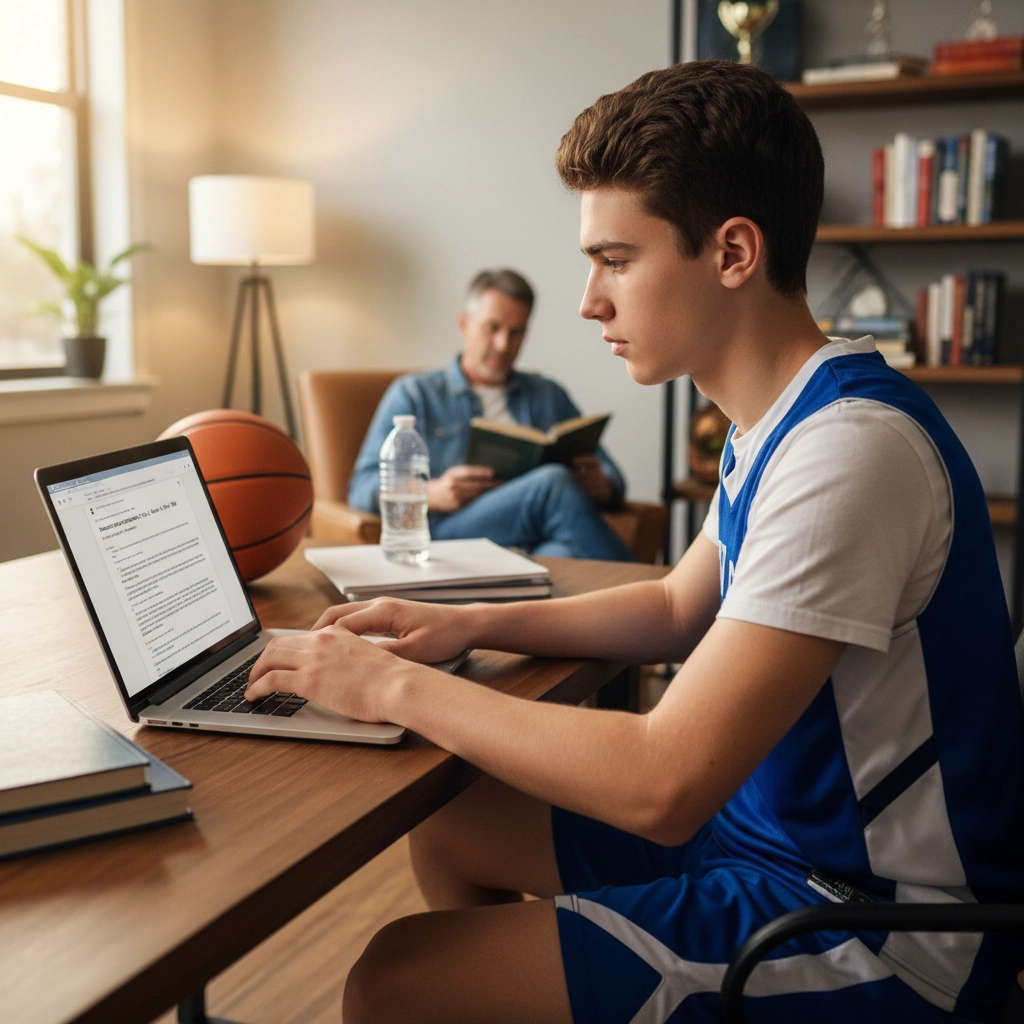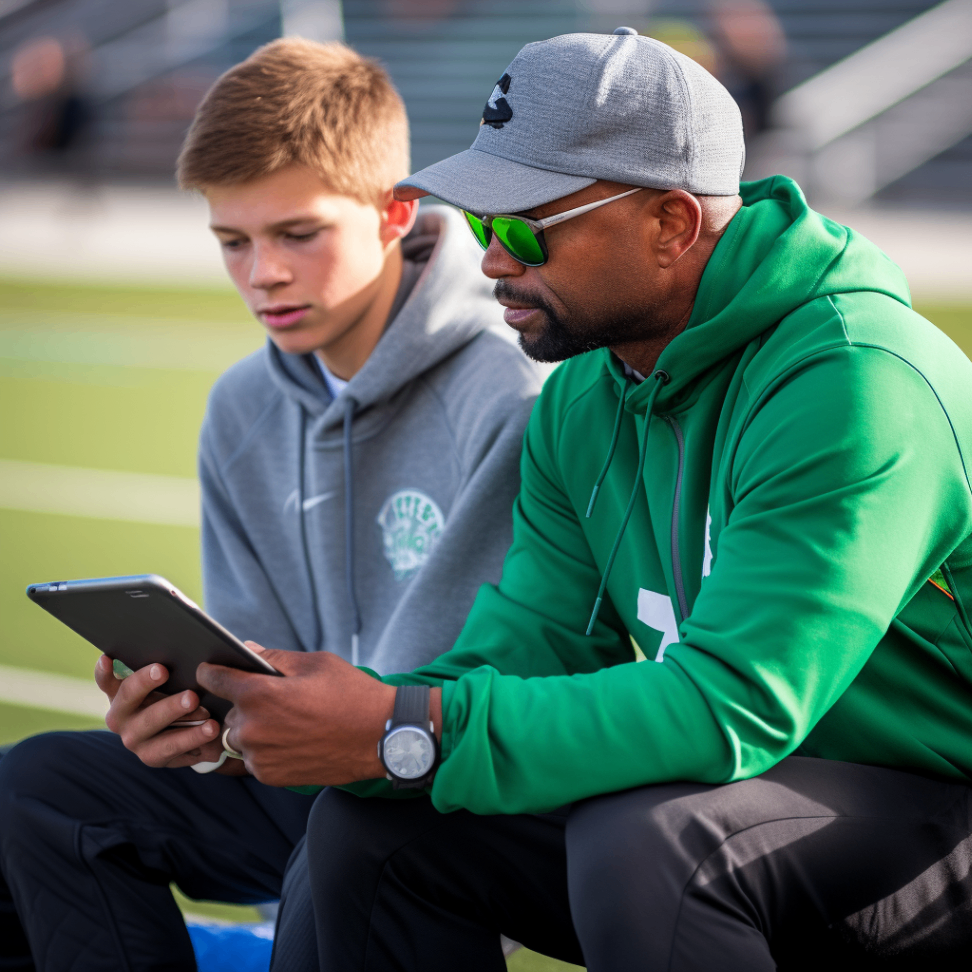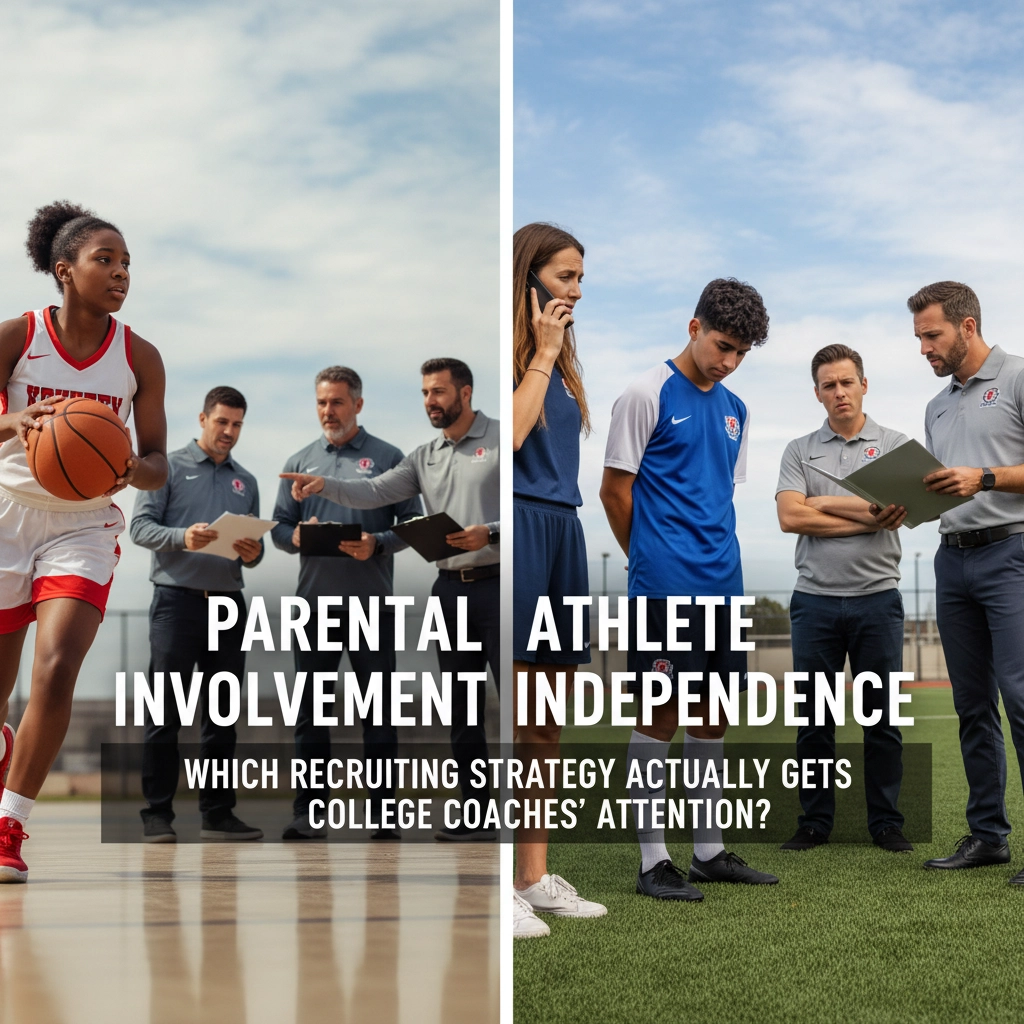College coaches evaluate both the athlete and their parents, but athlete independence consistently serves as the deciding factor between similarly talented recruits. While parental involvement predicts up to 30% of student-athlete experiences compared to just 1% for demographics, coaches are specifically looking for athletes who demonstrate initiative and leadership qualities, with parents playing a supportive rather than dominating role.
Here's what you need to know about striking the right balance in today's competitive recruiting landscape.
The Athlete Initiative Advantage: Why Independence Wins
When coaches assess two similarly skilled players, the differentiating factor often comes down to who takes ownership of their recruiting process. Andy Fleming, head men's soccer coach at Xavier University, puts it bluntly: "I always notice and am impressed with kids who are diligent with their emails, calls, etc. Often you can sense when a parent does this for them or when a parent is more excited than the kid."

College counselor Matt Musico frames the issue perfectly: "What kind of personality makes more sense on a successful athletic team? Obviously, it's the person who takes initiative and wants to take on that leadership role." Coaches want to see confident student-athletes who can hold insightful conversations and make decisions independently: not athletes who fade into the background while their parents speak for them.
This shift toward valuing independence isn't just about personality preferences. It reflects what coaches know about successful college athletes: they need to be self-motivated, resilient, and capable of handling adversity without constant parental intervention. The recruiting process serves as an early test of these crucial qualities.
Why Parents Still Matter in the Equation
Despite the emphasis on athlete independence, coaches are actively evaluating parents as part of the recruitment package. Pat Fitzgerald, former head football coach at Northwestern University, stated: "An increasingly large part of the evaluation process for us is evaluating the parents. When we talk about our fit we evaluate parents too, and if parents don't fit, we might punt on the player and not offer him a scholarship."

Coaches meet with parents to assess insights into the recruit's character and values. They're seeking answers to critical questions:
Will the recruit value academics alongside athletics?
How will they handle adversity and setbacks?
Do they respect authority and coaching feedback?
Will they demonstrate emotional intelligence with teammates?
Can they be trusted to represent the program positively?
Parents essentially provide a window into the athlete's upbringing and potential character development. The key is that parents are being evaluated as indicators of the athlete's character, not as the primary decision-makers in the process.
What the Research Reveals About Balance
Recent studies on NCAA student-athletes across all three divisions show that parental involvement comprises four key strategies: support, contact, academic engagement, and athletic engagement. However, these strategies have nuanced effects that parents and athletes need to understand.
The Positive Outcomes
Appropriate parental involvement leads to:
Higher academic confidence in student-athletes
Greater athletic satisfaction and enjoyment
Reduced depression and anxiety levels
Fewer risky behaviors and better decision-making
Stronger overall well-being and adjustment to college life
The Trade-offs
The research reveals an important tension: high parental support correlates with lower emotional and functional independence in student-athletes. When parents remain heavily involved in academic matters, athletes report less emotional and functional independence, though they may achieve higher academic standards.

Most parental involvement is characterized as "generally moderate and appropriate, rather than overbearing," which counters popular narratives about helicopter sports parents. The key is tailoring involvement to support without smothering.
Red Flag Behaviors That Kill Recruiting Opportunities
For approximately 95% of recruits who aren't so talented that coaches will overlook problematic parents, certain behaviors create major red flags that can derail recruiting opportunities entirely.
Dominating Communication
When parents send emails or make calls on behalf of the athlete rather than the athlete reaching out themselves, coaches immediately notice. Messages from the athlete make a substantially bigger impact than those from parents. Coaches want to assess the athlete's communication skills, maturity level, and genuine interest in their program.
Speaking for the Athlete
During campus visits, phone calls, or meetings, parents who answer questions directed at their child or dominate conversations signal that the athlete may lack the independence necessary for college success. Coaches are specifically trying to engage with recruits to evaluate their personality, decision-making abilities, and leadership potential.
Over-Managing the Process
Parents who micromanage every aspect of the recruiting process: from scheduling visits to negotiating scholarship terms: send a clear message that their child isn't ready for the independence that college athletics demands.
The Winning Strategy: Strategic Support with Clear Athlete Ownership
The most effective approach combines strategic parental support with clear athlete ownership of the recruiting process. Here's how successful families structure this balance:

Athlete-Led Communication
Athletes initiate all contact with coaches
Athletes write their own emails and texts
Athletes ask questions during campus visits
Athletes make the final decision about their college choice
Behind-the-Scenes Parental Support
Parents help research schools and programs
Parents provide guidance on evaluating scholarship offers
Parents assist with logistics and scheduling
Parents offer emotional support throughout the process
Collaborative Decision-Making
Family discussions about priorities and values
Parents help athletes develop evaluation criteria
Shared research on academic programs and career outcomes
Parents participate in meetings when appropriate, but don't dominate them
Practical Implementation Tips
For Athletes:
Take ownership of your recruiting profile and keep it updated regularly
Draft your own outreach emails to coaches
Prepare thoughtful questions for campus visits
Be ready to articulate your goals and interests independently
For Parents:
Focus on being a sounding board rather than a spokesperson
Help with research and logistics behind the scenes
Model appropriate communication and professional behavior
Trust your athlete to lead conversations with coaches
For Families:
Establish clear roles and boundaries early in the process
Practice having the athlete lead conversations at home
Use texting for efficient parent-athlete communication during busy periods
Focus discussions on learning and enjoyment rather than just performance outcomes
The Bottom Line: Independence Wins, but Support Matters
The recruiting landscape has evolved to favor athletes who demonstrate independence, initiative, and leadership qualities. While parental involvement remains important for character development and support, coaches are looking for athletes who can stand on their own and represent their programs with maturity and confidence.
The winning strategy isn't choosing between parental involvement or athlete independence: it's about finding the right balance where parents provide crucial support while athletes visibly drive their own recruiting process. This approach demonstrates the maturity, leadership, and initiative that college coaches seek in their recruits while still allowing parents to fulfill their important supportive role.
Remember, the recruiting process is ultimately about finding the right fit between athlete, family, and program. When that balance is achieved, everyone wins: the athlete develops crucial life skills, parents maintain their supportive role, and coaches get recruits who are ready for the challenges and opportunities of college athletics.


